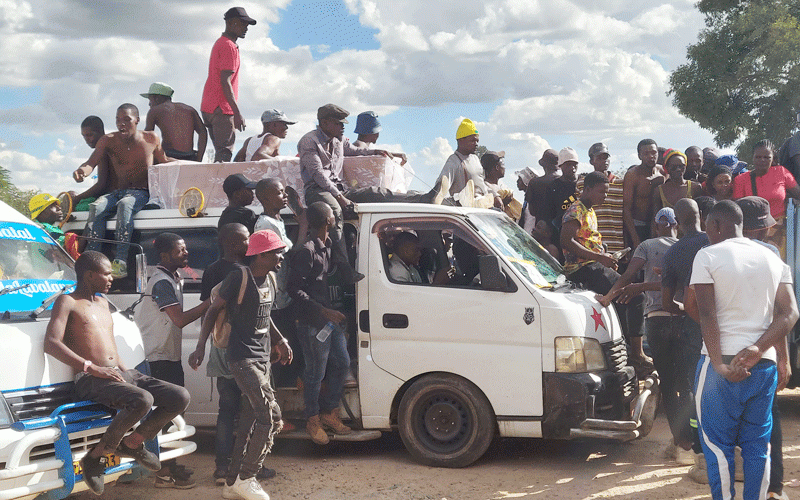
Appalling, terrifying and alarming. This defines the disbelief and heartbreak of how Chitungwiza residents feel over the surge in drug-induced deaths in the area.
Since the beginning of the year several drug-induced deaths have been confirmed in Chitungwiza while a myriad other drug users are either receiving treatment in hospital or are going through rehabilitation.
Many are dying in their homes.
The community has been left stunned and grappling with questions.
Heartbreaks like what is happening in Chitungwiza and other parts of the country include, not only the grief and mourning of individual families, but of the whole society.
While residents mourn, process the events and replay over and over the circumstances of these deaths, they remain shrouded in denial.
Drug abuse is emerging as a global public health issue and according to a world drug report of the United Nations Office on Drugs and Crime released last Wednesday, it is estimated that 292 million of the global population (aged between 15 and 64 years), used drugs last year.
A new report from the World Health Organisation (WHO) highlights that 2.6 million deaths per year were attributable to alcohol consumption, accounting for 4.7% of all deaths, and 0.6 million deaths to psychoactive drug use.
- Over 115 to exhibit at Mine Entra
- Young entrepreneur dreams big
- Econet bemoans power outages
- Govt opens ChiTown e-passport centre
Keep Reading
Notably, two million of alcohol and 0.4 million of drug-attributable deaths were among men.
“We tend to ignore the reality, people are dying because of these illicit brews,” said an elderly man at a recent funeral in Zengeza.
“Everyone is quiet about it while the so-called whiskies are displayed in most bars and bottle stores.”
At the funeral wake, mourners, mostly the deceased’s colleagues with no remorse spent the night drinking the illicit stuff.
They are having a hard time accepting reality.
“Death is inevitable, whether you like it or not, we are all going to die,” said one of the mourners who preferred to be called Shabba.
“Even if you drink musombo [illicit stuff brewed out of water and fertiliser] or you drink lager, you will die, my friend.
“I don’t have money to buy beer, so I will drink what I can afford.”
Shabba said he only needs a dollar to get drunk.
Over the past few years counterfeiting has become widespread in the country’s liquor industry amid the proliferation of “backyard distillers” that are brewing illicit alcohol.
The distilleries are making fake whiskey, brandy, vodka and other counterfeit alcoholic concoctions.
The illicit alcohol is sold for a song in and outside bottle stores, street corners and open-air joints across the country.
“We are losing our colleagues to these tumbwa [illicit substances],” said a kombi conductor who prefers to be called Simba.
“Since January, I know five colleagues who have succumbed to these drug-induced deaths.”
However, Simba said society was in denial over the deaths.
“The community is filled with uncertainty, but the reality is people are dying because of these illicit brews,” he said.
“We have normalised the situation, but we are dying.”
During eulogies people tend to hold the negative aside and heap praises on the deceased, Simba said.
“The issue about drugs and substances is not even said during graveside speeches,” he said.
“Society only watches with no solution in sight.
“It seems we have lost the war.”
Tecla Chironde of St Mary’s said her brother became addicted to the extent of forgetting to take his antiretroviral drugs.
“He died because he defaulted on the life-saving drugs because of these illicit alcohols,” she said.
“At his funeral everyone was just talking about his defaulting of drugs, not tumbwa.
“He was not eating food at all, he died a miserable death.”
While sources at medical institutions in Chitungwiza confirmed that most deaths were caused by drugs and substances, authorities at Chitungwiza Central Hospital were sceptical.
“There are no such cases recorded at Chitungwiza Hospital,” said the hospital’s public relations officer Audrey Tasaranarwo.
Investigations carried by the Truth Diggers revealed that fake alcohol was being produced from a mixture of water and ethanol on an industrial scale before the colourless substance was tinted and flavoured.
There has been an increase in the number of spirit distillers, many of whom are unlicensed, investigations have revealed.
Last year, one Robert Nyemudzo, a disqualified Zanu PF candidate for Chipinge South, was sentenced to 18 months imprisonment for contravening the Harmful Liquids Act.
Nyemudzo was brewing illicit spirits, mixing ethanol with water at his home at Checheche growth point in Chipinge.
As part of investigations, the Truth Diggers also ascertained that there were hordes of illegal distillers in Harare feeding the local liquor market.
Some of the “whiskey” brands on the market include Black Panther, which is produced at a location in Ardbennie and Locardia, produced in Ruwa, both in Harare.
A popular “brand” called Vox is manufactured in Chitungwiza.
A blend master with a local brandy manufacturing company said fake alcohol was not safe.
“This alcohol is intense with no monitoring, which makes it toxic,” he said.
“One pointer of fake whiskey or brandy is the smell and the different levels of the bottled substance because it is done by hand unlike in a manufacturing plant.”
He said it was not safe for someone to drink a bottle-and-a-half of whiskey in 24 hours as this could cause immediate damage to the liver, which could be lethal.
Public health expert and medical doctor Johannes Marisa said people, who use drugs and substances are susceptible to HIV and STIs.
“People with HIV take ARVs every day to stay healthy so taking alcohol can make it hard to focus and stick to a daily HIV treatment regimen,” Masara said.
“Defaulting medicines allows HIV to grow which damages the immune system.
“Drug interactions between ARVs and drugs or alcohol can increase the risk of dangerous side effects.”
Southern African Alcohol Policy Alliance Zimbabwe programmes and policy director Wongai Nyahuye said society has normalised the alcohol situation in the country.
“It is unfortunate indeed and I think we need to understand that we are dealing with a very aggressive and vicious alcohol industry,” Nyahuye said.
“The alcohol industry has normalised the abnormal using its huge capital to perpetuate a false narrative on alcohol norms and culture in Africa and even beyond.
“The alcohol industry has ridden on the acceptability of alcohol across societies, it has used slights that it is a prefix for social interactions, you even see the huge influence that alcohol has on popular sport such as soccer. So this has ingrained the idea that nothing is wrong with alcohol.
Nyahuye said the drug fight has been over emphasised against available data that alcohol related issues are responsible for three million deaths per year.
“You will see that in the recent document, the master plan that was unveiled on June 26, alcohol is replaced by the term substance use or abuse,” he said.
“There seems to be some hesitancy in taking the bull by its horns and saying alcohol is responsible for this and that.
“Somehow the industry does not want alcohol to be specified as a harm. So in a way this has contributed to that which you refer to as not accepting the reality. So we need an alcohol policy which articulates all these issues.”
Nyahuye said it was important for the country to address the alcohol issue as a whole before beginning to classify alcohol in its licit or illicit status.
There is a need for a comprehensive alcohol policy which addresses the alcohol story as a whole,” he said.
“Tumbwa in my view, exists because we have not dealt accordingly with licit alcohol issues.
“As such, these illicit brews now present themselves as a shadow of the real issue at hand.”
In a move meant to curb the drug scourge President Emmerson Mnangagwa last week launched the Zimbabwe Multi-Sectoral Drug and Substance Abuse Plan (2024-2030).
The comprehensive plan aims to combat the growing issue of drug and substance abuse across the country over the next six years.
Mnangagwa said the drug bane “knows no bounds” therefore needs collective effort to curb it.
“In this regard, the scourge of drug and substance abuse has to be dealt with decisively as we march towards Vision 2030. Vanhu vaka sticker havavake nyika,” he said.
UN resident and humanitarian coordinator Edward Kallon speaking at the launch said there was a need to stem the flow of drugs through rigorous measures against trafficking and dealing.
“Dealers and traffickers must be met with unwavering resistance, and stringent laws must be enforced to curb the supply of these harmful substances,” Kallon said.
“Central to this mission is the engagement of youth.
“Young people are not only the leaders of tomorrow, but the vanguards of today in our relentless battle against substance abuse.
“We must harness their energy, ingenuity, and drive to lead awareness campaigns, educate their peers, and champion a drug-free lifestyle.”
Kallon said there was a need to enforce stringent measures against traffickers and dealers who prey on the vulnerable.
“It is through this collective and compassionate approach that we will reclaim our communities and build a brighter, drug-free Zimbabwe.”










